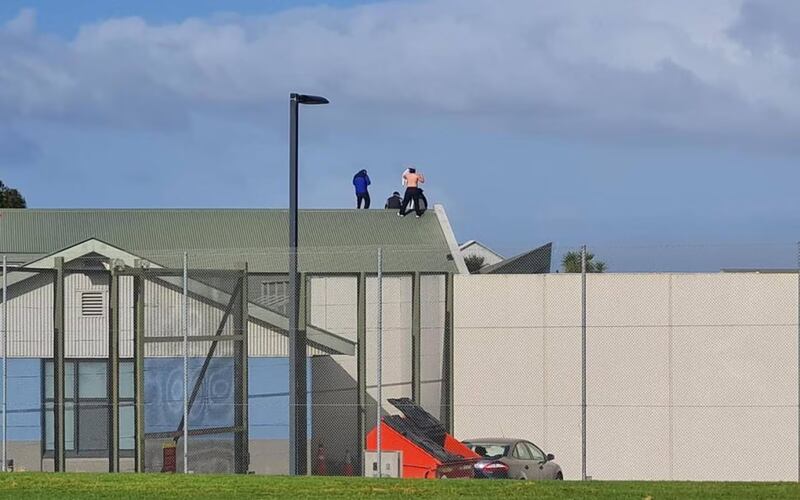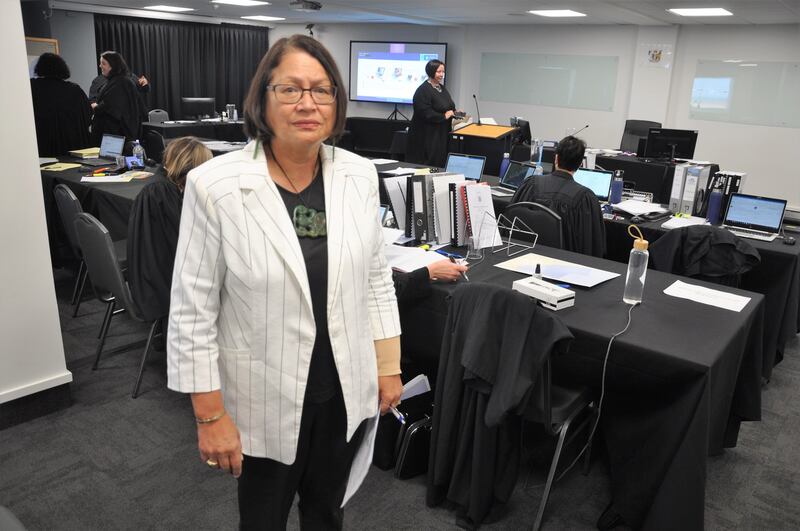Staff at an Oranga Tamariki facility allegedly oversaw MMA-style fights within an OT facility in Wiri, South Auckland, allegedly to establish a pecking order within the rangatahi housed at the facility. Video / Newshub via NZME
"Oranga Tamariki is broken beyond repair," according to Lady Tureiti Moxon, who chairs the National Urban Māori Authority, which advocates for the rights and well-being of whānau Māori in urban settings, addressing issues of social justice and promoting cultural empowerment.
"For the state to continue operating these facilities against this backdrop is dysfunctional," Moxon says.
Our tamariki (children) have been targeted and abused for decades in these state-run facilities, and this must stop."
Moxon's comments come after 17 staff at various Oranga Tamariki youth justice facilities and children's residences across the country have been stood down amid sexual misconduct and coordinated fight allegations.
Three weeks ago two staff were stood down for alleged sexual abuse toward rangatahi within the facilities.
Last week eight teens made their way onto the roof of a facility in Wiri, with Children's Minister Kelvin Davis accusing them of wanting "fast food and things like that".
"They wanted things that teenagers want," Davis said at the time.
Days later police were investigating a leaked video showing the teens MMA-style fighting at the facility, allegedly supervised by staff to develop a pecking order within the facility.
Fifteen staff there have since been stood down.
Moxon says the permanent closure of the Oranga Tamariki facilities and its devolution to the community is the only answer to "stopping the rot" within Oranga Tamariki (formerly CYFS).
According to Moxon, the late Tā Wira Gardiner, former chief executive of Oranga Tamariki, successfully closed the youth justice residences, providing evidence that it is possible to effect change.

Teens on the roof of the youth justice facility. Photo / RNZ / Bailey Brannon
Moxon argues that government agencies often default to their traditional practices in challenging circumstances.
"How many more failed reports will it take for the government to dismantle and devolve Oranga Tamariki?" Moxon asks.
Many reports, including the Ombudsman's Report in 2020, Children's Commissioners' reports, the Waitangi Tribunal Report, the Whānau Ora Commissioning Agency Report, and the Independent Child Monitor Report in 2023, have exposed systemic failures within Oranga Tamariki.
The organisation's own response to the Royal Commission into Historical Abuse in State Care further highlights a history of failures.
"The Waitangi Tribunal recommended establishing a transition authority independent of the Crown in the report He Pāharakeke, he Rito Whakakīkinga Whāruarua (Wai 2915)." Moxon says.
"Oranga Tamariki’s own ministerially appointed panel also advised of their concerns."
Immediate government-level discussions are recommended by the National Urban Māori Authority, according to Tureiti.
"We need to commission services from trusted and experienced community providers," Moxon says.
Moxon says there remain frameworks for placing rangatahi (youth) safely in the community, using existing frameworks such as Whānau Ora, Te Pūkotahitanga, and Te Aka Whai Ora (Moxon, National Urban Māori Authority).

Lady Tureiti Moxon says Orannga Tamariki is 'broken beyond repair' and its youth justice facilities should be closed down. Photo / Supplied
Yesterday ACT went in the other direction, saying it will put 17-year-olds back into the adult justice system if it is part of a government after the election.
The law and order policy would revert a change ACT once supported.
In 2016, the National government upped the youth justice age to 18, thereby trying 17-year-olds in the youth courts for all but the most serious offences like murder, manslaughter, sexual assaults, aggravated robbery, arson, or serious assaults.
Tureiti reiterates moving away from the outdated "lock 'em up and leave" approach, saying it keeps youth out of sight and out of mind in punitive institutions.
The National Maori Urban Authority is advocating for what it says are proven alternatives like Te Pae Oranga, a restorative justice programme that holds perpetrators accountable and enables them to make amends with those they have harmed.
"In 2021 the government invested $70 million in Te Pae Oranga, indicating its 'effectiveness," Tureiti says.



